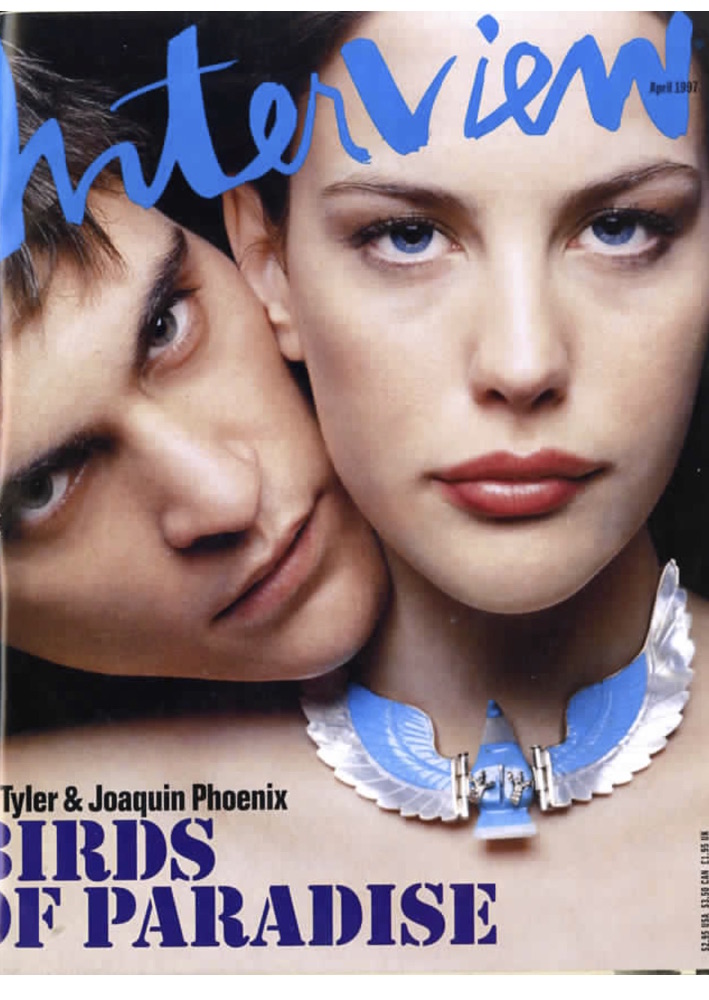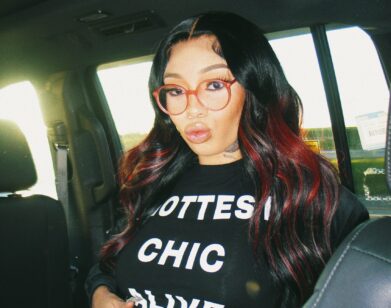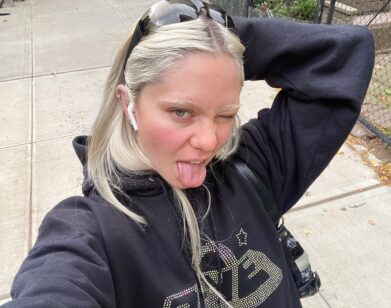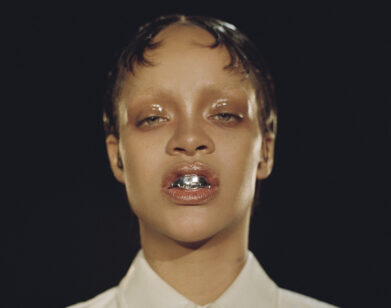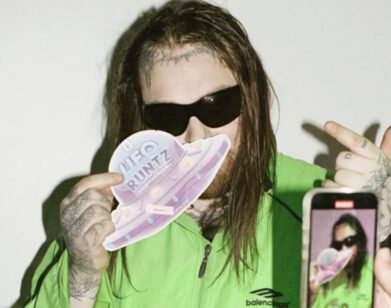New Again: Liv Tyler and Joaquin Phoenix
Last week, in honor of the 20th anniversary of Rex Manning Day—a day dedicated to a fictional celebrity from the 1990s cult classic Empire Records—Rough Trade in Brooklyn transformed itself into the Empire Record’s titular store. The 1995 film takes place over the course of one day, and follows a group of teenagers employees (played by Liv Tyler, Renee Zellweger, Rory Cochrane, Robin Tunney, Ethan Embry, and Johnny Whitworth) as they prepare to host a signing for singer Rex Manning.
While crowds arrived at Rough Trade last week to revel in the film’s glory, this weekend we anticipate an even larger mass for Record Store Day.
Here, we revive a 1997 interview with Empire Records star Liv Tyler and her former boyfriend, Joaquin Phoenix, to celebrate the legacy of the film and our love of records. —Johanna Li
Inventing the Future: Spring has sprung for actors Liv Tyler and Joaquin Phoenix
Ingrid Sischy
INGRID SISCHY: Liv, you grew up in Maine, right?
LIV TYLER: Yes. My mom [Bebe Buell] and I lived in Portland, and my aunt lived in Yarmouth and still does, in a big white house with a barn and trees and a yard and a John Deere lawn-mower that we’d sit on and ride.
SISCHY: Sounds like heaven.
TYLER: It was.
SISCHY: And then—
TYLER: We were ready to take a step and move to New York. I was totally for it. We packed up a big U-Haul, drove to the city, and started over.
SISCHY: Like The Beverley Hillbillies?
TYLER: [laughs] New York was fun as a kid. I loved to go walking. It was an adventure.
SISCHY: What are some of those memories?
TYLER: I remember throwing my retainer into a garbage can one time and my mom yelling, “Get your ass over here now!” And I had to dig through the garbage and find my retainer.
SISCHY: Did you?
TYLER: Yes. We brought it home and boiled it so I could put it back in, but it became mutilated.
SISCHY: No matter. Soon the photographers were snapping away, huh? How was it being a teenage model?
TYLER: A lot of fun, like playing dress-up. I’d feel ugly and awkward and chubby, and they’d transform me. Not that that makes everything better. Then my mom shopped the pictures around, I guess, and the agencies started calling. I wound up going with a little agency, Spectrum. It all happened really quickly, I started modeling for magazines like YM and Seventeen, and I did a couple of bigger things like Italian Vogue. At a certain point I became really frustrated with it, like, why do I have to go home after school and get dressed up and put makeup on my face, and then go to a photographer’s studio where there’s 15 other girls with their books and have to prove myself? A lot of people don’t think of it that way, but modeling’s a hard job, physically and emotionally.
SISCHY: Of course, the paradox is how bad modeling actually makes a lot of people feel about themselves.
TYLER: I was always a little bit chubbier than everyone else. But I would feel pain for some of the other girls, who were so young and felt they had to be so skinny. They’d be living in the model apartments, totally wrapped up in this whole world. And it made me more sad than anything.
SISCHY: And then?
TYLER: I just remember saying to myself that I’d much rather do movies than modeling, and that it was worth a try.
SISCHY: So what made you have any faith in it?
TYLER: I didn’t really know anything about it. I hadn’t seen many movies, or so-called, good movies. When I was a kid, I was obsessed with Star Wars and Night of the Living Dead. When I got more curious about the movies, I thought they were something you had to learn about and go to school for and read every book. I thought it was like putting a telephone together. Then I got my first part [in Silent Fall, 1994]—I guess I was 15 or 16—which was really outrageous because I still knew nothing. I don’t think I really learned how to land on my marks until after Empire Records [1995], ’cause sometimes I’ll see a shot in that film, and I’m like “Whoa, I just walked over to the corner.”
SISCHY: When do you think you begin to have a deeper understanding about what films could be?
TYLER: Maybe not until I did Heavy [1996]. That’s really when I got excited and not threatened or terrified. I felt really comfortable and wanted to run through all my lines with [co-star] Shelley Winters and watch every movie she made. I’d been so scared to start with. The first day on set, the assistant director said to me, “Okay, that’s your mark,” and I froze. I was like, “What do you mean?” And she said, Well that’s where you have to stop.” And I said, “You mean I have to land there without looking at it?” I practically had a heart attack.
I was on Stealing Beauty [1996] and then I started feeling acting was something I wanted to do forever. It made me feel [like] I’ll still be looking for parts when I’m 70 years old. Working with Bernardo [Bertolucci, director of Stealing Beauty] was my first experience of being able to communicate with someone whom I’d think of as a mentor, who’d ask me my opinion and trust me, and believe in me and allow me to do the things that I wanted to do. The film itself was also rare in terms of character most of the scripts I’ve read are the story of some man, and there might be a love interest or a big woman’s part, but even so…
JOAQUIN PHOENIX: We were talking about how we pick up these scripts and every time—
TYLER: Every single time—
PHOENIX: —they introduce a woman, it says, “a beautiful young woman.” Every single script.
TYLER: But it’s always a story about a man!
PHOENIX: Or if they’re strong women, they’re outlaws and they’re killing men.
TYLER: Or they’re women who have to go through so much and conquer the world.
PHOENIX: It’s the same thing when films are about homosexuality. It always has to be an issue.
TYLER: The same thing with interracial relationships.
PHOENIX: There’s never a movie where there’s a black man and a white woman and they live together but it’s not an issue. Why can’t movies just show those things as a part of life?
SISCHY: And what is it about movie stars that make us treat them like they’re from another planet? Liv, I’m sure you experienced that at the Cannes Film Festival when you went for the premiere of Stealing Beauty last year.
TYLER: I laughed at the whole thing because it didn’t feel real. I remember getting off the red-eye when I arrived in France. I had a cowboy had on and some zit medicine, and there were like 15 photographers who jumped over the luggage carousel to take pictures of me. Half of [the paparazzi] didn’t know my name. They were calling me Liz Taylor and things. The best part of that trip for me was that I got to stay in the Clint Eastwood Suite in my hotel—it has a really long bathtub.
They gave me these two bodyguards, who I became friends with, and we had police escorts everywhere because of the mobs. When I was leaving, the bodyguards brought me to the airport and carried my bags onto the plane and practically put me in my seat. Then, when I got off the plane in England, it was back to reality. There was no one there to help me make the fast switch, and I missed my flight back to New York. I had to run through like three terminals just to get to a desk where this woman would not help me. I was so depressed. But then I thought, “Thank you, Lord, for throwing me back to the ground.”
When I got off the plane in America, a driver came to pick me up and he said, “Look!” and there was a girl standing there with flowers. I thought, “Oh, how sweet.” Then Joaquin started walking toward me.
SISCHY: Joaquin was the girl standing with flowers? [laughs]
TYLER: Yes. So beautiful.
SISCHY: That’s hilarious. So Joaquin? Flower boy. I know you just love being interviewed.
PHOENIX: Aaaaaah. [all laugh]
SISCHY: You know, Joaquin, whenever I think about you I always come back to having-acting-in-the-blood thing. Thinking of you and your brother [the late River Phoenix] and sisters [Rain, Summer, and Liberty Phoenix], you remind me of the Barrymores. It’s really incredible that in one family there are so many fine performers.
TYLER: They’re all so beautiful and talented. The Phoenixes can do anything—acting, music …
SISCHY: Do you have any sense of why you’re all so motivated that way?
PHOENIX: I guess it was this space that our parents created for us to be creative in. We were always encouraged to express ourselves. We spent our days talking and singing and we were always in front of an audience. It wasn’t what they call “normal” growing up. We started off signing at children’s hospitals and in jails and things like that in Central America. Then we moved to the States; at some point we started singing on the streets in Westwood [in L.A.]. We’d be these five kids singing all these songs in front of crowds.
TYLER: Why do you think you’re all so geared up to performing?
PHOENIX: I suck at painting and writing; I tried both. For me, it’s acting because I grew up with it. When we moved to California, we all did commercials and TV shows. Riv was the first to get a TV show and me and my sister Liberty guest-starred on another show it was kind of accidental.
SISCHY: I wonder. [The doorbell rings. It’s Summer Phoenix. Everyone discusses where to get a baby present on a Sunday. Summer tells Joaquin she loves him and she’ll see them later, and leaves.] Joaquin, what was the first movie you were in?
PHOENIX: It was SpaceCamp [1986]. I was nine or 10.
TYLER: Which I remember watching on HBO when I was like eight years old. He was like Luke Skywalker. He had a robot for a friend.
PHOENIX: Then I did Parenthood [1989] and To Die For [1995].
SISCHY: How did To Die For come up?
TYLER: I guess they’d been trying to cast that character for quite some time. When I read the script, I thought it was incredible. I auditioned for Gus [Van Sant, director of To Die For] and the producer, and a week later, they gave me a call.
SISCHY: By then, you hadn’t worked for a while. How did you know that you wanted to do it?
PHOENIX: I just looked in my head and there were all these characters roaming around in there, and I wanted to put them someplace. Acting was an outlet for me.
SISCHY: What was it like going back?
PHOENIX: It was so natural. I fell right into it. A lot of it had to do with Gus. He has a real comfortable feeling; there aren’t all these busybodies running around him telling you what to do. We’d just read through the script and do it at our own place.
SISCHY: Were you surprised at the incredibly positive critical reaction?
PHOENIX: I was surprised that I didn’t get fired. [Liv Tyler laughs] And I was shocked when the reviews came out and people said good things about me; I couldn’t believe it.
SISCHY: Joaquin, we talked before about the stereotypes that are shoved onto actresses actors also have this burden. Today, with young male actors, there’s another kind of expectation. It’s not the Gary Cooper or James Stewart thing that gets handed down anymore, it’s the lingering James Dean thing: Be cool, be a rebel. To me, that’s just as oppressive.
PHOENIX: What is the source of that? With magazines, is it because that’s what people really want, or is it that magazines are assuming that’s what people want so they’re putting it out there? I don’t know if all that stuff comes from them or us, but that’s why I live so much for Edward Norton because he just doesn’t seem to care about all that. Most young actors seem to want to look cool and dirty all the time.
TYLER: To me, the coolest are the terminally uncool, you know?
SISCHY: [laughs] Let’s talk about Inventing the Abbotts, the movie you’re both in that comes out this month. What made you want to do it? Liv, you first.
TYLER: The script. It moved me, and made me cry.
SISCHY: Did you know Joaquin was in it?
TYLER: No… Well, that was the catch. They couldn’t find the guy for the part that Joaquin ended up playing. It was around the time I was finishing up on That Thing You Do! [1996] and I was getting worried. Then Pat [O’Connor, director of Inventing The Abbotts] called me one day and said, “I met this guy, and I think he’s fantastic. I’d love for you t meet him. His name’s Joaquin Phoenix.” I was like, “Oh my God, why didn’t I ever think of that? That is perfect.” And I just fainted on my hands and knees.
PHOENIX: When casting directors get desperate, I come in and they go, “Okay, we need somebody so you’ll do.”
SISCHY: So that’s when the two of you met and fell for each other, huh? You obviously liked the script, too, Joaquin?
PHOENIX: Yes, I love scripts about relationships, and I love to see puppy love evolving into this mature love and communication. This one also has an evolving relationship between my character, the younger brother, and his mom [played by Kathy Baker]. And there’s the relationship between me and my older brother [played by Billy Crudup]. It starts off typical with the older brother thinking the younger one’s annoying. The younger one looks up to him, and then the tables turn. There’s a really beautiful scene—because it’s very simple and it’s very short—with them talking and fighting about these old family secrets. They’re confused about what the story was, and then they figure out what it was, and they say goodbye to each other. It’s heartbreaking.
SISCHY: Liv, who did you look up to as a kid? Were there writers or actors who were your heroes or heroines?
TYLER: I didn’t read much as a kid. Strangely enough, when I first met my dad [Aerosmith singer Steven Tyler], I didn’t know he was my dad and I fell in love with him. I put his poster on my wall.
SISCHY: That’s amazing.
TYLER: I would talk to him on the wall. And he would give me stuffed animals, and I would tuck them into bed before I would get in. I loved him so deeply.
SISCHY: So somewhere you knew.
TYLER: My mom has a diary entry or something where I wrote, “I think Steven is my father.” I had the same feelings for Todd [Rundgren, who raised Liv as his daughter]. I would go to sleep at night and wake up at like 6 in the morning and creep up the little steps to the tower where he would be on his computer. I would just sit there.
SISCHY: How about you, Joaquin?
PHOENIX: [silence]
SISCHY: Fair enough. Let’s eat.
THIS INTERVIEW ORIGINALLY RAN IN THE APRIL 1997 ISSUE OF INTERVIEW.
New Again runs every Wednesday. For more, click here.

